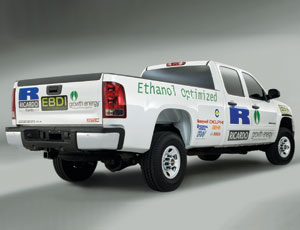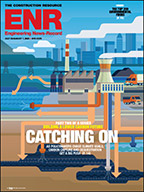Although combinations of in-cylinder systems and exhaust after-treatment are the most likely ways manufacturers will meet clean-diesel requirements over the next five years, researchers are looking at alternative fuels, including gasoline. This alt-fuel interest is being pushed by the industry’s hope of finding a cleaner and more cost-effective way to power construction machinery.

Electrification already has made its debut in commercially available construction equipment during the past two years. For example, Komatsu has been producing its 22-ton PC200LC-8 hybrid excavator in Asia since 2008, and Caterpillar has been delivering D7E diesel-electric bulldozers since late last year.
One up-and-coming technology is Ethanol-Boosted Direct Injection (EBDI). The dual-fuel, flex-fuel engine can run on gasoline-ethanol blends ranging from standard pump gasoline to E85 high-ethanol fuel. In January, clean-energy research company Ricardo Inc. introduced the prototype of its EBDI engine in a 1-ton pickup truck fitted with a 3.2-liter V6 engine. Graham Weller, Ricardo’s product group director for diesel projects, says it provides up to 30% better fuel economy than a standard gasoline engine, delivers diesel levels of torque and meets today’s emission regulations without complex after-treatment.
Researchers at the University of Wisconsin-Madison are successfully testing a diesel engine that reaches new heights of efficiency by running on a mix of diesel fuel and gasoline. An engine computer instantly adjusts the proportion of each fuel injected into the cylinders to meet the demands of heavier or lighter loads. In recent tests, the engine reached 59% thermal efficiency, compared to about 44% for a standard diesel, which translates to about 31% better fuel efficiency. Professor Rolf Reitz, who headed the tests, says emissions easily are meeting the EPA’s 2010 on-road diesel standards.
Another emerging technology is homogeneous charge compression ignition (HCCI), in which a gasoline engine runs without spark plugs. HCCI uses compression to ignite the fuel, similar to the way a diesel operates. HCCI can deliver 15% to 30% better fuel economy than a traditional spark-ignited gasoline engine, experts say. One challenge of HCCI is controlling the combustion over a wide range of operating conditions. Automakers have put the engine into prototype cars, but none has yet been tried in construction equipment.




Post a comment to this article
Report Abusive Comment